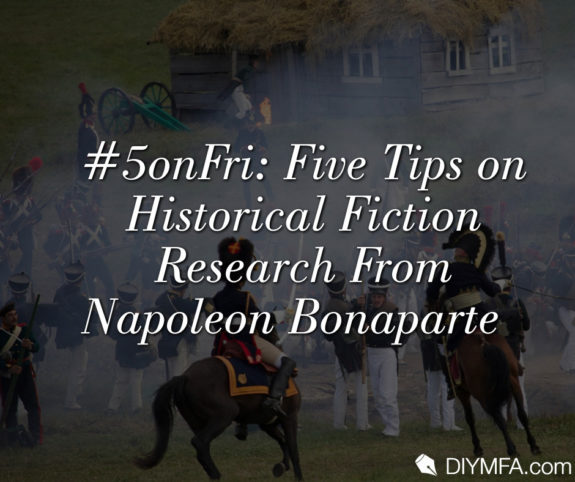I’m a historical fiction author so it’s a safe bet that I love research. Unfortunately, historical research is like Netflix: Limit its consumption or you’ll never find time to write. So, today, let’s examine how to conduct research without overwhelming your main task—writing the book. For advice, I’ve enlisted my own research subject, the master strategist Napoleon Bonaparte.
1. “I have seen, in the most significant of circumstances, that some little thing always decides great events.” Emperor Napoleon to his minister Tallyrand.
Before you dive into the research ocean, identify the “little thing” and “great event” that make your story unique. That discovery can save you time and prevent your drowning in information.
How do you find those pearls before you research?
First, jot down one sentence about why you’re writing this particular story. Add a second sentence about why that time and place interest you, and a third about your main character’s quest. Can you identify from those sentences the “little thing” and the “great event” on which the story turns? Remember your great event doesn’t have to be Napoleonic in scale. It can happen to a village, a family, or a heart.
Mull those sentences over. They define the scope of your story. Concentrate your research within its boundaries.
For example, when I learned young Napoleon Bonaparte tried to write a romantic novel, I vowed to write a book in which the aging emperor finished that manuscript. Napoleon’s rise and fall was the “great event.” How the old man viewed his youthful idealism was the “little thing” that drove the story.
Knowing that, research for my novel Finding Napoleon focused on who he was as a person at the beginning and at the end of his life. I could ignore battles, geopolitics, and most of the 60,000 books about him.
2. “Riches do not consist in the possession of treasures, but in the use made of them.” Napoleon Bonaparte, attributed.
Research is a servant to Story, not the other way around. At its best, it produces fascinating characters in an authentic, sensory world, ripe with internal and external conflict. At its worse, it turns a story into a lecture.
Ernest Hemingway (to quote a second oversized ego) said he wrote “on the principle of the iceberg.” Seven-eighths of his meaning was underwater. As a researcher, you see the entire iceberg. As a writer, you convey the essence through the least number of details.
Use your research riches to build the physical, cultural, and emotional setting where your story lives. Use them to shape your story within the confines or interstices of history. Use them to illuminate your character’s motivations. The moment you think you might be showing off new-found knowledge, you probably are.
Pro-tip: To test the iceberg principle on your manuscript, read through your pages, highlighting instances in which you explain historical or technical facts to the reader. Which explanations can be turned into active scenes that advance the story? Which should be eliminated? Revise until everything that remains serves the story.
3. “What a thing is imagination! Imagination rules the world.” Napoleon Bonaparte in exile, commenting on soldiers who were moved to greatness by his presence.
Like the soldiers who found inspiration at the mere sight of Napoleon, let research supercharge your imagination. Let it provide the sensory experience, the voice, and the emotion that spur your imagination.
Pro-tip: Get the big picture first. If you’re not an expert, history books for middle-grade students, the For Dummy series, Chronicle Publications, David Macaulay’s How Things Work, and other simple publications can provide a quick framework. Once you know the basics—the people, geography, religion, technology, major events—you’re ready for a deeper dive into details.
If you can, travel for inspiration. On location, search out lodgings, food, walks, churches, bad weather, boat trips, anything close to what your characters experienced. Visit small, local museums where a curator might provide surprising insight. Take photos to comb for details and enhance your web presence. Above all, pause to see, feel, smell, hear, and taste the environment.
Travel locally. You may not be able to travel to Russia, but you can cook borscht in your own kitchen. Drive to the nearest hilltop without light pollution to see the starry sky as our ancestors saw it. Sit in the woods and feel wilderness around you. Savor those authentic feelings, then adjust the details to reflect your characters’ experience.
When you can’t travel in person, the Internet will take you anywhere. As a starting place, the website The History Quill offers its excellent guide 50+ Top Online Research Resources for Historical Fiction Writers in exchange for your email address.
Search out primary sources from your novel’s era, especially memoirs, diaries, newspapers, and the books your characters read. Primary sources provide more than facts—they are role models for your characters’ voices and opinions.
Of course, books. To save money, download free out-of-copyright books from Google Books or search websites like Abebooks.com for inexpensive used books. When you visit a library, ask the librarian for help. (For example, at my request, my library in Virginia borrowed microfilm of 1890s newspapers from a public library in North Dakota.)
4. “Take time to deliberate, but when the time for action has arrived, stop thinking and go.” Napoleon, attributed.
Set a time limit for the research-only phase. How much research is enough depends on the complexity of your subject. Is your protagonist living in an isolated Viking village? Research her daily life, physical environment, religion, and the social structure of her village. If she’s driving social change in Revolutionary France, you’ll need all that and more.
When your deadline’s up, STOP THE RESEARCH. Write a messy first draft or, at least, an outline.
Then continue your research as you rewrite and revise, filling in the blanks of your knowledge, finding fodder for new plot twists, and correcting errors.
Once you’re in the writing phase, concentrate your best energy on the writing. When your brainpower begins to lag, research for new inspiration.
Pro-tip: During your early drafts, skip over information you don’t know, putting a searchable placeholder such as [XXX] for the unknown detail, as in “at night they crossed [XXX] River.”
5. “The greatest general is the one who makes the fewest mistakes.” Napoleon, from the Correspondance.
Historical Fiction is a minefield of authors’ mistakes. Smile when you’re criticized, learn from it, and move on.
To limit the damage, recruit multiple Beta readers with varied experience. You’ll be surprised what you don’t know. (A clever critique partner told me that deer don’t lap; they sip—a detail I never would have fact-checked.)
Beware Experts: Professional historians may object when you change established facts. If you ask one to be a Beta reader, be upfront about how you’ve bent history. Remind them you’re looking for details (mahogany trees don’t grow in that location) or anachronisms (that gun wasn’t invented until twenty years later). Always be gracious and humble—after all, they are technically right.
Your last and best defense is your Author’s Note. There you explain the inspiration for your book and where you twisted or invented facts. Above all, remind the reader that your book—while well-researched—is an imaginative interpretation.
Finally, take joy in what you’ve created and all you’ve learned.
Bonus Tip: Write a second book in the same place and time so that all that research does double duty!

Margaret Rodenberg’s debut novel, Finding Napoleon, includes an adaptation of Napoleon Bonaparte’s real attempt to write a romantic novel and a rare look at his last love, the audacious Albine de Montholon. For research, she traveled to St. Helena Island in the remote South Atlantic, where Napoleon died and much of the novel takes place. Connect with her on social media or on her website FindingNapoleon.com.







